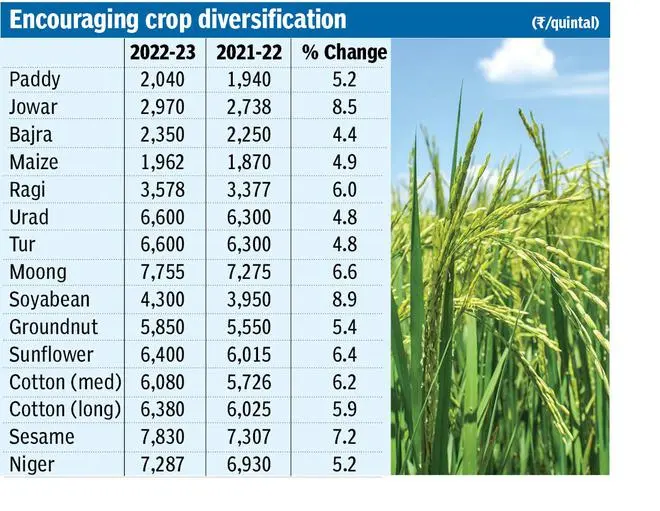Views of stakeholders in the agriculture sector are mixed on the 4.4 per cent to 8.86 per cent increase in minimum support price (MSP) for the kharif crops announced by the Centre on Wednesday. Farmers feel that the Centre could have done much more to cover the rising costs, while the trade, especially the oilseeds sector, felt the increase in MSP will result in higher acreage.
Shetkari Sanghatana leader Anil Ghanwat said the hike in MSP will not help farmers in any way. “The input cost has gone up much more compared to the MSP hike announced by the government. Government must understand that MSP hike is not the answer to the problems farmers are facing,” he said.
Further, Ghanawat said the MSP will encourage farmers to grow more paddy and wheat as the government focuses on the procurement of these grains. The diversification to other crops will be hampered, he said.

“Farmers have been selling urad, tur, moong below MSP as the government has not procured from farmers. Farmers can sell their produce at a higher price if the government stops intervening in the market and stop importing when prices are high in the domestic market. Let the market decide the prices and there will be no need for the MSP,” Ghanwat said.
Away from grains
Basavaraj Ingin, President, Karnataka Pradesh Red Gram Growers Association, said the Centre could have announced a higher MSP for pulses as the input costs including the labour wages have gone up significantly. The MSP increase announced for pulses such as tur and urad is 4.76 per cent each and for moong, it is 6.6 per cent.
“The MSP hike is nominal and not even 10 per cent. The Government should have taken more care of pulses growers by announcing a higher MSP taking inflation into account,” he said.
Suresh Nagpal, Chairman, COOIT (Central Organisation for Oil Industry & Trade), said the hike in MSP for oilseeds is a step in the right direction. “As farmers get a secured price for their crops, it will encourage more farmers to grow oilseeds as well as prompt them to shift away from grains. The area under oilseed cultivation has been on a steady rise over the last few years and with today’s rise, we expect it to rise further. As a result of the secured price (MSP) provided by the Government, the cultivation of mustard seed reached 91.44 lakh hectares during the last Rabi crop season. Needless to say, it will benefit farmers, customers and other stakeholders as a whole,” Nagpal said.
Rahul Chauhan of IGrain India said farmers remember prices only during the selling and at the time of sowing. With the MSP of paddy crossing ₹2,000 levels, farmers will increase acreage in Punjab, Haryana, and Uttar Pradesh. Pulses acreage may see a decline, while oilseeds will gain in Madhya Pradesh, Maharashtra and Rajasthan, Chauhan said.
Inflationary pressure
Kalyan Goswami, Director General, Agro Chem Federation of India, said the rise in MSP of commodities such as oilseeds, pulses, nutri-cereals, and cotton is higher than for paddy. This would encourage farmers to reduce the cultivation of water-intensive crops and would motivate crop diversification. This would also help to reduce the import of oilseeds and pulses. However, the only concern is that while increased MSPs may boost rural incomes and purchasing power, this can also increase inflationary pressures further.
To note, the wholesale inflation in April 2022 rose to 15.08 per cent, which is the highest in the last one and a half decades. So the MSP hike needs to be worked out cautiously and logically, keeping all these factors in mind, Goswami said.
While farmers in Gujarat have welcomed the Centre’s decision on MSP, they termed it insufficient compared with the overall inflation. Vitthal Dudhatara, a farmer leader from Saurashtra, said, “The hike in MSP is lower than the price rise we have seen in inputs and logistics costs. There was the need for at least a 10 per cent hike in the MSP, anything less than that is insufficient.”
Notably, the market price for groundnut and cotton are already ruling above MSP. Therefore, farmers feel that the hike in MSP remains ineffective on the ground. “Even though the market rate for cotton was almost double from last year, there was up to 40 per cent damage to the crop. Therefore, farmers did not make expected returns. Now the market prices are high, therefore procurement will not take place. So it’s no benefit for farmers,” said Vijay Kakadiya, a cotton grower from Lilapur village in Jasdan taluka of Rajkot district.
With inputs from our Pune and Ahmedabad bureaus







Comments
Comments have to be in English, and in full sentences. They cannot be abusive or personal. Please abide by our community guidelines for posting your comments.
We have migrated to a new commenting platform. If you are already a registered user of TheHindu Businessline and logged in, you may continue to engage with our articles. If you do not have an account please register and login to post comments. Users can access their older comments by logging into their accounts on Vuukle.